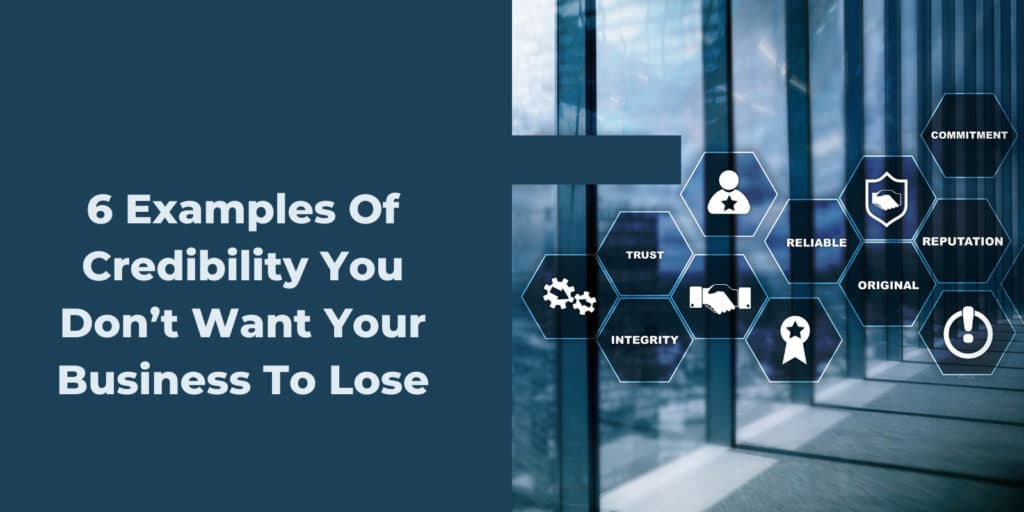Estimated reading time: 5 minutes
Being a credible person is a pet peeve and is extremely important to me. Maintaining credibility on a personal or professional level should be a priority for all of us.
The term credible is defined as “capable of being believed; believable, worthy of belief or confidence; trustworthy.”
Maintaining credibility with key stakeholders creates trust, and stakeholders and customers are more loyal when they trust a business they interact with.
Let’s look at some examples.
What is your first thought when you think about:
- Your Local Government
- Costco
- The United Way
- The Post Office
- Walmart
- The Ritz Hotel
- Wall Street
Some of these organizations are the gold standard for customer service. Some make you cringe. What do you want your business to be like?
While being credible is important to all aspects of business, the following are some areas of credibility that can affect the satisfaction and experience of key customer groups: employees, volunteers, vendors, and customers.
6 Areas Of Credibility You Don’t Want to Lose
1. Financial
Organizations owe it to their stakeholders (shareholders or donors), employees, and customers to be honest and transparent with finances.
Stakeholders need to feel confident that the shared financial numbers can be believed and trusted.
Employees want to work for organizations that are financially credible, and customers want to do business with organizations with the right motives and intent.
There have been countless corporate scandals involving how organizations manage their finances and ‘cook their books’ for personal gain.
For shareholders, this means an inaccurate representation of stock values. For non-profit organizations, donors want to know that their money was spent on its intended purposes.
It is sad when an organization masks organizational issues by using creative financial reporting tactics to mislead stakeholders.
2. Marketing
Organizations that market products and services must deliver the product or service that was represented.
Whether it is internet marketing or a billboard advertising something, the end product should always be what was described.
Have you ever been drawn into a business by an advertisement only to discover a “bait and switch” going on?
For instance, we read an ad for an advertised car only to learn that the advertised product was “out of stock” and a more expensive model was all that was available.
Situations like this tarnish an organization’s reputation and can create a negative public perception.
I won’t return to a business if I know I was intentionally deceived. I’m sure most people wouldn’t.
3. Management
There needs to be credibility with the way organizations are managed.
This is important not only with its employees but also with customers and the general public.
Customers recognize when an organization’s management practices are professional and credible. This credibility is demonstrated by its response to issues.
Management’s response to customer issues and complaints communicates to the public a lot about the organization’s credibility.
For instance, organizations make mistakes. However, businesses with a good service recovery process will maintain a high level of credibility with customers because they demonstrate that they care.
When customers have continuous unresolved product or service issues, the organization’s credibility will come into question.
Remember, credibility is about trustworthiness and following through on what was promised.
4. Service
Service after the sale is always important in maintaining credibility with the customer.
I remember we built a house, and up until the day we closed on the property, the service was outstanding.
The minute we signed on the dotted line, the service levels fell to an unbelievably low level.
It went from being one of the best purchasing experiences I have ever had to one of the worst.
Service after the sale is how customers judge an organization and good customer service is critical to growing and retaining a solid customer base.
5. Personal
Organizational leaders are obliged to be credible in all areas of their lives. They should say what they mean and do what they say.
Wavering leaders confuse employees.
Leaders with character influence and inspire. We follow the lead of those with influence because we are drawn to their leadership.
However, it is always sad to hear the stories of fallen leaders for inappropriate transgressions of sexual misconduct, financial fraud, or hate speech.
These embarrassing situations affect the credibility of the entire group, whether they are corporate CEOs, athletes, politicians, or TV personalities.
Having personal credibility is crucial for anyone in leadership because leaders inspire behaviors – both good and bad.
6. Product Credibility
Credibility with the quality of our products or services helps give confidence to those who purchase from us—the intersection of where brand recognition and credibility meet.
For instance, the recall of airbags that took the lives of 8 people calls into question the credibility of an organization that knowingly continues to sell products that could harm the general public.
Putting profits before people is wrong-causing harm or even death is unfathomable.
Credibility Is A Choice
The decision to be credible, as an organization and as an individual, is a conscious choice.
It is sometimes challenging to maintain a high level of credibility. However, with the proper priority and focus, striving to be a credible organization can result in a reputation for quality, transparency, and honesty – all of which will result in business growth.
How much credibility does your organization have?
